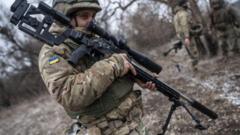Current discussions involve a "reassurance force" comprising approximately 20,000 troops to protect key Ukrainian assets and provide aerial support, with skepticism surrounding a potential ceasefire agreement.**
Multinational Force Proposed for Ukraine Ceasefire Support**

Multinational Force Proposed for Ukraine Ceasefire Support**
A newly suggested multinational troop presence in Ukraine aims to bolster confidence and security amid ongoing conflict.**
The potential deployment of a multinational force in Ukraine—currently termed the Multinational Force Ukraine (MFU)—is under consideration as a strategy to reinforce any ceasefire and instill long-term trust in the region. Sources familiar with the negotiations emphasize the distinction between this proposed force and traditional peacekeeping missions, suggesting that it should be labeled a "reassurance force" instead.
With plans to deploy around 20,000 troops, the MFU's primary objective would not be to enforce peace but to provide air cover, ensuring the safety of Ukraine's airspace and preserving naval routes in the Black Sea to facilitate trade activities. The troop presence would focus on protecting urban centers, commercial ports, and essential energy infrastructures throughout the country.
Importantly, discussions indicate that these troops may not be stationed near frontline areas in eastern Ukraine, ostensibly to avoid provoking Russian concerns regarding aggression. Russian President Vladimir Putin has firmly maintained that any foreign troop presence in Ukraine would oppose a ceasefire agreement.
In line with the military strategy, sources clarify that this multinational effort should not be equated with traditional peacekeeping forces, which typically require impartiality and the consent of both opposing sides. Instead, the envisioned MFU would actively support Ukraine and bolster efforts to deter any future threats from Russia.
An essential aspect of the planning involves securing air defense assets that Ukraine currently lacks, leading to talks on which nations could contribute warplanes. Additionally, strategies for ensuring safe maritime operations in the Black Sea are being considered, including provisions for mine-clearing and naval task force presence.
The possibility of U.S. involvement remains uncertain, as American officials have signaled reluctance to offer military support for the European force on the ground. Consequently, European leaders aim to formulate an effective strategy independently, with hopes that a robust initiative might persuade the U.S. to reassess its position.
All ongoing discussions hinge on the establishment of a ceasefire in Ukraine, as many local observers express skepticism regarding Russia's willingness to halt hostilities. As negotiations progress, the international community continues to watch closely, analyzing the implications for regional stability and security.


















